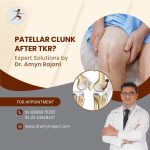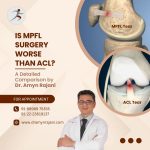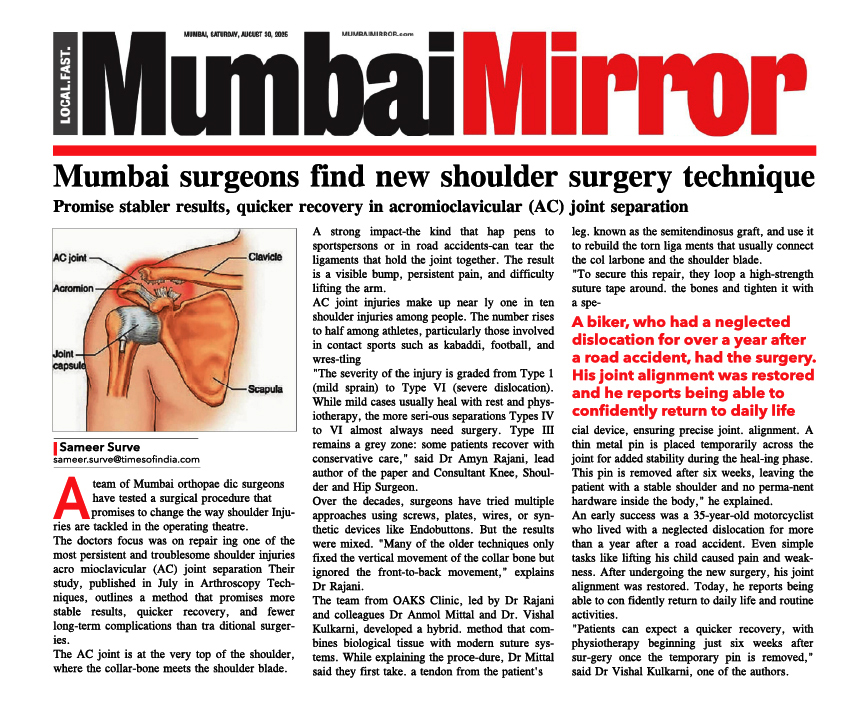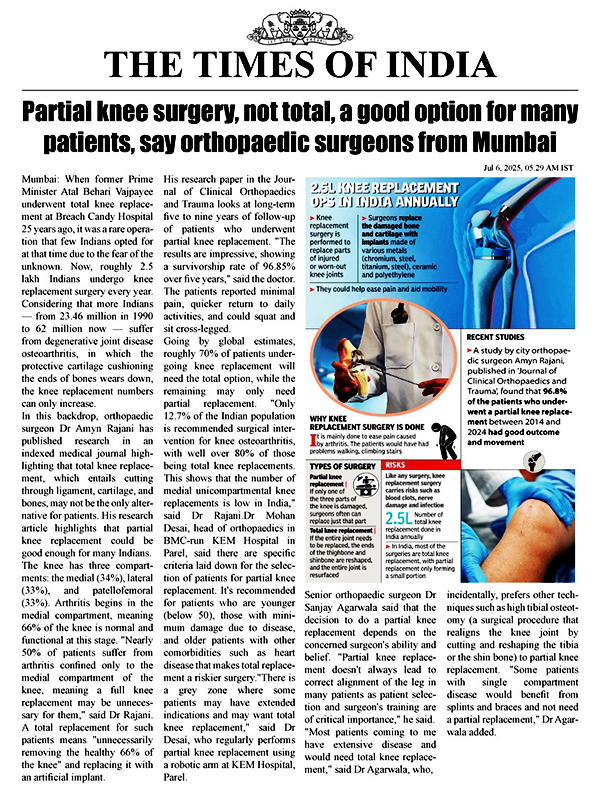Cartilage damage is a common yet often misunderstood condition that can significantly impact mobility and quality of life. As a cushion between bones, cartilage plays a vital role in ensuring smooth joint movement. When damaged, it can lead to pain, stiffness, and long-term joint problems. In this blog, we’ll explore the causes, symptoms, and treatment options for cartilage damage, with insights from leading orthopaedic surgeons in Mumbai and orthopaedic surgery specialists in Mumbai.
What is Cartilage?
Cartilage is a flexible, connective tissue found in various parts of the body, including joints, the rib cage, and the ear. In joints, it acts as a shock absorber, reducing friction between bones and enabling smooth movement. Unlike other tissues, cartilage has a limited blood supply, making it difficult to heal once damaged.
Causes of Cartilage Damage
Cartilage damage can occur due to a variety of reasons, including:
- Trauma or Injury: Sudden impacts, such as those from sports injuries or accidents, can tear or fracture cartilage.
- Wear and Tear: Over time, repetitive stress on joints can lead to cartilage degeneration, commonly seen in conditions like osteoarthritis.
- Lack of Movement: Prolonged inactivity can weaken cartilage, making it more prone to damage.
- Obesity: Excess weight puts additional pressure on joints, accelerating cartilage wear.
- Genetic Factors: Some individuals are genetically predisposed to cartilage-related issues.
Symptoms of Cartilage Damage
The symptoms of cartilage damage can vary depending on the severity and location of the injury. Common signs include:
- Joint Pain: Persistent pain, especially during movement or weight-bearing activities.
- Swelling: Inflammation around the affected joint.
- Stiffness: Reduced range of motion and difficulty moving the joint.
- Clicking or Grinding Sensation: A feeling of the joint “catching” or making noise during movement.
- Instability: A sense of the joint giving way or being unable to support weight.
If you experience any of these symptoms, it’s essential to consult a joint replacement specialist in Mumbai or an orthopaedic surgeon in Mumbai for a proper diagnosis.
Diagnosis of Cartilage Damage
To diagnose cartilage damage, an orthopaedic surgery specialist in Mumbai may perform the following:
- Physical Examination: Assessing the joint’s range of motion, stability, and tenderness.
- Imaging Tests: X-rays, MRIs, or CT scans to visualize the extent of the damage.
- Arthroscopy: A minimally invasive procedure where a small camera is inserted into the joint to assess the cartilage directly.
Treatment Options for Cartilage Damage
The treatment for cartilage damage depends on the severity of the injury, the patient’s age, and their activity level. Here are some common treatment options:
-
Non-Surgical Treatments
- Physical Therapy: Strengthening the muscles around the joint can reduce stress on the cartilage and improve mobility.
- Medications: Anti-inflammatory drugs or pain relievers can help manage symptoms.
- Lifestyle Modifications: Weight management and low-impact exercises can slow cartilage degeneration.
- Injections: Corticosteroid or hyaluronic acid injections may provide temporary relief.
-
Surgical Treatments
For severe cartilage damage, surgery may be necessary. Some advanced surgical options include:
- Arthroscopic Surgery: A minimally invasive procedure to remove damaged cartilage or repair small tears.
- Microfracture: Creating tiny holes in the bone to stimulate new cartilage growth.
- Cartilage Transplantation: Transplanting healthy cartilage from another part of the body or a donor.
- Joint Replacement: In cases of extensive damage, a joint replacement specialist in Mumbai may recommend partial or total joint replacement surgery.
Preventing Cartilage Damage
While not all cartilage damage can be prevented, certain measures can reduce the risk:
- Maintain a healthy weight to reduce stress on joints.
- Engage in regular, low-impact exercise to strengthen muscles and improve joint stability.
- Use proper techniques and protective gear during sports or physical activities.
- Avoid repetitive stress on joints by taking breaks and using ergonomic tools.
The Role of an Expert Specialist
Choosing the right specialist is crucial for effective treatment and recovery. A seasoned joint replacement specialist in Mumbai or orthopaedic surgery specialist in Mumbai can guide patients through both surgical and non-surgical options, ensuring the best possible outcomes.
Dr. Amyn Rajani - Expert Care for Joint and Cartilage Injuries
When it comes to cartilage damage treatment and joint care, Dr. Amyn Rajani stands out as a leading orthopaedic surgeon in Mumbai. With extensive experience in arthroscopic procedures, joint replacements, and sports injury treatments, Dr. Rajani is committed to delivering personalized care with the highest standards of medical excellence. His expertise has helped countless patients regain mobility and live pain-free lives.
Conclusion
Cartilage damage can significantly impact your quality of life, but with the right diagnosis, treatment, and rehabilitation, full recovery is possible. By understanding the causes, symptoms, and treatment options for cartilage damage, you can take proactive steps to protect your joints and maintain an active lifestyle. Whether you require conservative management or advanced surgical intervention, consulting with an experienced orthopaedic surgeon in Mumbai, like Dr. Amyn Rajani, can make all the difference in your journey toward recovery.
Book your consultation today and take the first step towards pain-free mobility!
Location: OAKS Clinic, Mumbai: https://g.co/kgs/f4L4sNS
Contact: 91-88989 75355 / 91-22-23619137





